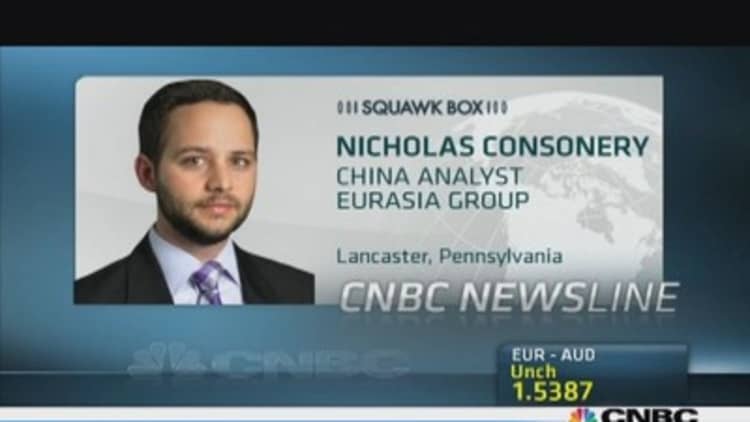Inside the hotel's front entrance, a white mechanical yak nods and says "Moo." Beyond it is the centerpiece of the compound: a vast glass atrium with a replica of a Tibetan and ethnic Qiang village filled with three-story stone and wood buildings, each housing a restaurant or bar. Corn husks sit atop the roofs.
For visitors, this is the first sight of paradise, or more precisely Jiuzhai Paradise. One of the biggest hotels in China when measured by number of rooms — 1,010 of them spread across seven buildings — it is part of a mountain resort nestled in a fog-wreathed forest in a Tibetan area of western China. What draws tourists is its proximity to the Jiuzhaigou Nature Reserve, the most famous park in the country, a wonderland laced with emerald lakes that is China's equivalent of Yellowstone or Yosemite.
(Read more: China's corruption crackdown targets the holiday mooncake)
That this kind of hotel could be built on such pristine land is a testament to the political connections of its founder, Deng Hong, a billionaire and one of the most famous businessmen in Sichuan Province.
People with knowledge of business and politics in Sichuan said Mr. Deng was close to Li Chuncheng, the deputy party chief of Sichuan who is now being investigated by the Communist Party's anti-corruption commission. Mr. Li was detained in December 2012, and the inquiry has been widened to other powerful figures in Sichuan.
On Nov. 8, Xinhua, the state news agency, posted on its website an article from Beijing News that said Mr. Deng had been formally arrested. Police officers in the city of Xianning, where Beijing News said Mr. Deng was being detained, declined to comment, as did representatives of Mr. Deng's company.
Mr. Deng, 50, the son of an air force officer, made his fortune in the hotel and exhibition center business. He was listed by the 2013 Hurun Rich List as the 290th richest person in China, with a net worth of about $1 billion.
He has an ambitious list of projects, including the New Century Global Center, a mall and hotel complex in Chengdu that is the world's largest building, but Jiuzhai Paradise is the one most dear to him. A painter and calligrapher, Mr. Deng designed the hotel and often stayed there with his family.
(Read more: China's anti-corruption drive hits New Year sales)
"I think the whole hotel represents his vision," said Tyson Wang, the general manager, who works for InterContinental Hotels Group, a British company. It has been contracted to manage 13 properties developed by Mr. Deng's company, including resorts in the Maldives and Micronesia and a 2,000-room hotel in Lhasa, Tibet.
Mr. Deng envisioned Jiuzhai Paradise as what the Chinese call a "lost city in the mountains," Mr. Wang said. "From a distance, you see nothing. All of a sudden, there's a giant five-star."
But Mr. Deng has not been to the resort in about a year, Mr. Wang said, and the Beijing News article said his last public appearance was in Chengdu in February last year. The corruption investigation in Sichuan appears to run parallel with an even more delicate one that is scrutinizing former executives at state oil companies and the family of Zhou Yongkang, a former Sichuan party chief who retired in 2012 after years overseeing China's state security apparatus and legal system while on the elite Politburo Standing Committee.

It is unclear exactly how Mr. Deng fits into that puzzle, though party investigators often use bribery confessions by businesspeople to build a case against officials. The company founded by Mr. Deng, Exhibition and Tourism Group, or ETG, based in Chengdu, declined to comment. Asked about Mr. Deng's detention, Mr. Wang said, "We can't talk about that."
Mr. Wang is a polished, English-speaking hotel manager who understands the vagaries of the justice system — he was a police bodyguard in Harbin before being assigned in 1994 to a joint hotel venture between the police department there and Holiday Inn. Later, Holiday Inn hired him away.
Jiuzhai Paradise opened in 2003 under the management of ETG. In 2007, the company signed InterContinental as the manager, the first of their 13 ventures together.
Paradise is what the hotel aims to sell. It can arrange horseback rides with Tibetan nomads, rafting in Goddess Lake and tickets to a dance show that features 150 ethnic Tibetan and Qiang performers. Attendants in the lobby are mostly Han, the dominant ethnic group in China, dressed in traditional Tibetan robes.
(Read more: Burberry confident in China despite luxury crackdown)
Standard rooms at the hotel go for about $305 a night, excluding taxes. In 2012, the hotel had revenue of nearly $50 million, Mr. Wang said.
The design of the rooms is a cross between a Tibetan home and a British pub. The rooms sell out during national holidays.
"I've turned my phone off so officials can't call asking for a room," Mr. Wang said during a holiday weekend last fall. "We're totally full."
Hotel guests visit the nearby Jiuzhaigou or Huanglong nature reserves and sit in the replica Tibetan and Qiang village around boiling hot pots of food. At the door of the Sichuan restaurant, lamb turns on a spit. Next to the Tibetan restaurant in the rear courtyard rises an 11-story stone edifice resembling a traditional Qiang village tower.

Some guests indulge in Tianyu Spa, which is 11,960 square yards and includes both a swimming pool and an indoor hot spring.
One Tibetan man in the area said the hotel had helped the local economy, even if the Tibetan employees mostly held menial jobs. (Mr. Wang said 10 percent of the 1,350 employees were from the area.) The Tibetan man did complain, though, that the hotel was a "Hanification" of the area's Tibetan culture.
One morning, a tourist from Jiangsu Province, Ma Minjun, 63, took photographs of the village as he and his wife walked through the central atrium. "I think this hotel is very beautiful; you don't find others like this," he said.
(Read more: Property database delay frustrates China anti-graft drive)
Mr. Deng began his entrepreneurial ventures selling clothes in Chengdu while practicing his art, Mr. Wang said. After living in the United States for a spell, he returned to China with enough capital to put together land development deals, a common route to vast fortunes in this country.
But that route also raises questions about corrupt relationships with local governments, because developers often rely on officials to grant them the land. Asked how Mr. Deng got this piece of forested land near the Jiuzhaigou nature reserve, Mr. Wang said: "I really don't know. But I really think it was a good idea."
More from the New York Times:
Monetary Policy in Japan: Finally on Track
New Political Faces in India
Comfort From the Cold Winds
Despite Mr. Deng's disappearance, none of the joint ventures between Mr. Deng's company and InterContinental appear to have halted. It was "business as usual," Mr. Wang said.
The Lhasa project is the most contentious. On Nov. 5, advocates of Tibetan independence demonstrated at several InterContinental hotels around the world to protest it.
The Tibet advocates say that the project will strengthen the Communist Party's grip on Tibet. Eleanor Byrne-Rosengren, the director of London-based Free Tibet, has said that InterContinental aims "to open a playground for the rich in the heart of a repressed nation."

